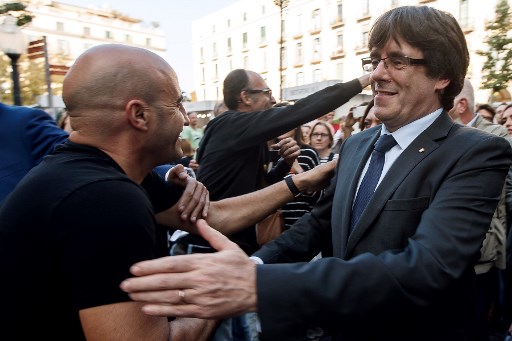
Catalonia’s secessionist leader defiantly called for “democratic opposition” to direct rule imposed by the central government on the semi-autonomous region after its parliament declared unilateral independence. / AFP PHOTO / Eddy Kelele
by Jordi Zamora Barcelo with Marianne Barriaux in Madrid
Agence France Presse
BARCELONA, Spain (AFP) — Catalonia’s secessionist leader Carles Puigdemont stood defiant Saturday against Madrid’s moves to depose him, urging “democratic resistance” to direct rule imposed in a bid to stop the region breaking away from Spain.
In a televised statement, Puigdemont accused the central government of trampling on the will of independence-seeking Catalans who rejoiced at Friday’s vote by regional lawmakers to declare an independent republic.
Madrid’s response to seize Catalan powers — the first curtailment of regional autonomy since Francisco Franco’s brutal 1939-75 dictatorship — constituted an “aggression”, he said, but insisted “democratic opposition” was the only response.
The central government’s intervention was “contrary to the will expressed by the citizens of our country at the ballot box,” Puigdemont said. “In a democratic society, only parliaments can appoint or dismiss presidents.”
In a copy of his speech sent to AFP, Puigdemont signed off as “President of the Catalan government”.
Spain is on a knife edge as it grapples with the worst constitutional crisis in its contemporary history, triggered by an unlawful Catalan independence referendum on October 1 that was shunned by many, and marred by police violence.
Throwing down the gauntlet in the escalating standoff, Catalan lawmakers on Friday passed a motion, by 70 votes out of 135 in the regional parliament, to declare a Catalan republic.
Opposition MPs refused to even vote on the issue and walked out in disgust.
– World is watching –
Prime Minister Mariano Rajoy responded swiftly by axing the Catalan government and parliament, and calling December 21 elections to replace them.
In an official government notice published Saturday, Rajoy’s deputy, Soraya Saenz de Santamaria, was put in charge of administering the region.
Saenz de Santamaria was due to meet secretaries of state who will likely take charge of regional ministries.
The world is now watching to see whether Puigdemont and his team will willingly step aside for caretaker envoys to be sent from Madrid.
Analysts warn that upheaval is likely, as civil servants may defy direct orders, or worse.
“We are likely to see more sustained unrest, possibly including strikes, as well as more serious clashes between national police and pro-independence activists,” said Federico Santi, an analyst at Eurasia Group, a US-based think-tank.
“We will continue to work to build a free country,” Puigdemont said.
But this must be done “without violence, without insults, in an inclusive way,” he insisted, and urged supporters to respect the opposition of pro-unionists — thousands of whom marched in central Madrid.
– Competing rallies –
The streets of Barcelona were largely empty Saturday after a night of firework-lit celebrations.
In Madrid, several thousand people gathered on the central Plaza Colon, waving the Spanish flag as loudspeakers blared the popular song “Y viva Espana” (long live Spain).
A small child was pushed by his father in a buggy sporting a sign proclaiming: “Together”, and some in the crowd waved placards calling for Puigdemont to be jailed.
“It is a shame what happened in Catalonia,” lamented anti-secessionist protester Carlos Fernandez, a 41-year-old mining engineer.
Rajoy received sweeping powers from the senate Friday under a never-before-used constitutional article designed to rein in rebels among Spain’s 17 regions, which enjoy varying levels of autonomy.
He used these to also fire Josep Lluis Trapero, the highest-ranking officer in the Mossos d’Esquadra police force, which will now fall under the interior ministry in Madrid.
– Allies show support for Spain –
Roughly the size of Belgium, the region of 7.5 million people accounts for about 16 percent of Spain´s population, a fifth of its economic output, and attracts more tourists than anywhere else in the country.
Before the current crisis, it enjoyed considerable autonomy, with control over education, healthcare and police.
The Spanish government has received unwavering support from the United States and its allies in the European Union.
The bloc is increasingly wary of nationalistic and secessionist sentiment, particularly after Britain’s dramatic decision last year to leave the EU.
Many people are also worried about of the economic impact, with some 1,700 companies already moving their legal headquarters out of Catalonia, which has an economic output equivalent to that of Portugal.
© Agence France-Presse








